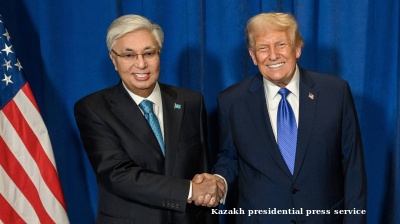For proponents of Armenia’s ongoing move towards the West, it’s been a big couple of weeks. On January 9, Armenian Prime Minister Nikol Pashinyan announced that his government would soon introduce a bill in parliament that would essentially begin the country’s process of applying to join the European Union. The bill follows on the heels of a nationwide petition last year calling for Armenia to move to join the EU, that gathered 52,000 signatures from supporters.
That move was followed by another auspicious meeting in Washington, DC just days later. On January 14, Armenian Foreign Minister Ararat Mirzoyan and his American counterpart, Secretary of State Anthony Blinken, signed a strategic partnership agreement between the two countries. The deal, described by Blinken as “a significant milestone in the relationship between the United States and Armenia”, provides for a raft of further collaboration between the two in the political, economic, energy and defence realms.
For the US, the deal is but one of many it has signed with international partners. For Armenia — while there are caveats — it could be revolutionary.
“While this document isn’t about security guarantees, it is an opportunity to deepen the [US-Armenian] relationship in different areas in the long term,” says Tigran Grigoryan, head of the Yerevan-based Regional Center for Democracy and Security. “It discusses several very important areas — energy, economy, military, international processes like democratic development and rule of law. So I think it will open a lot of doors, especially in the energy realm.”
One clause in the agreement relates to the purchase of sensitive technologies related to energy — a crucial advancement in the ongoing discussions regarding the US building a new nuclear power plant in Armenia. With Armenia currently reliant on Russian support to maintain and operate its aging Metsamor nuclear plant, which provides nearly one-third of the country’s electricity, this could significantly reduce one point of Moscow’s leverage.
“While talking to American officials in recent months, I could see their willingness for the US to be the party that builds this new nuclear plant [in Armenia],” Grigoryan says. “The existence of this separate clause in the agreement [on sensitive technology] probably means that Yerevan and Washington are going to agree on this as well.”
Armenia has always collaborated with Western powers to a nominal degree, including in international security: a contingent of Armenian troops participated in the US-led mission in Afghanistan. As Armenia’s security relations with Russia, its traditional arms supplier, have waned in recent years, Yerevan has sought greater defence cooperation with France in particular. The new strategic partnership agreement includes clauses on American advisory support to reform both Armenia’s armed forces and internal security organs, as well as further iterations of the joint US-Armenia Eagle Partner drills that have occurred for the past two years.
The new agreement also serves as an indication of shifting Western favour in the region. While Georgia had hitherto been the leading pro-Western actor in the South Caucasus, its star has fallen dramatically over the past years of leadership by the increasingly anti-Western Georgian Dream party. Georgia signed a strategic partnership agreement in 2009 — one that was suspended by Washington on November 30, in the wake of a government crackdown on protests that followed a flawed election and the halting of Georgia’s EU accession talks.
While much depends on the incoming Trump administration, current trends suggest that Armenia is likely to be the primary American partner nation in the region in the near future, Grigoryan says.
“If there is some sort of continuity in the American policies, then yeah, I would agree that Armenia is becoming the primary, and probably the only, partner of the United States of a strategic nature in the South Caucasus,” Grigoryan says.
“But for example, Ilham Aliyev, the Azerbaijani president, mentioned in his latest interview that he would be willing to elevate the status of [Azerbaijan’s] relationship with the United States to the strategic level under Trump. So a lot will depend on the new administration's approaches,” he says.
Azerbaijani pro-government commentators have often speculated that Baku’s relationship with Washington could improve after Donald Trump returns to the White House on January 20. Their hopes are not misfounded: Trump, after all, has a penchant for treating autocratic regimes kindly and paying less heed to democratic credentials than most American leaders. As of now, however, Azerbaijan continues to move further away from cooperation with the US, with the latest move being Foreign Minister Jeyhun Bayramov’s announcement on January 16 that USAID would no longer be allowed to work in Azerbaijan.
Armenian cooperation with both the US and EU, in contrast, continues to deepen. The EU border observation mission, deployed to Armenia in February 2023 in the wake of Azerbaijan’s invasion of Armenia in September 2022, is up for a renewal of its two-year mandate next month. While Baku despises the mission, accusing it of spying on its territory and demanding its withdrawal, its extension is a foregone conclusion, Grigoryan says.
“It will surely be extended,” he says. “It was clear already at the end of last year that this is going to happen. It’s just a matter of bureaucratic procedures, but it’s pretty much a guarantee.”
The value of the EU border observation mission to Armenia’s security has been proven numerous times over. Since its deployment, Azerbaijan has not been able to occupy any additional Armenian territory, as it did in May 2021, November 2021 and September 2022. The observers have also been able to refute Azerbaijan’s regular claims of Armenian provocations on the border, as they did just days ago.
The mission’s continuing importance as a deterrent has only been underscored by the continuing aggressive rhetoric of President Aliyev. Earlier this month, Aliyev described Armenia as a ‘fascist state’ and threatened to destroy it, stating "if the Armenian leadership does not destroy it [fascism], then we will”.
In this environment, stronger ties with international partners are more important for Armenia than ever. In this vein, the new US strategic partnership is intended to create continuity and lay out a roadmap for how the new Trump administration will hopefully approach relations with Armenia.
“I think there was concern, both on the American side and on the Armenian side, that Trump might be not interested in [further improving relations with Armenia],” Grigoryan says. “So there was an intentional decision after the election in the US to basically finalise all the processes that started under this administration before Trump's inauguration. There’s also some indications that [continuing these policies] has been discussed with Trump’s team,” he says.
As the world awaits the start of Trump’s new term, Armenia has at least secured a significant win in its realignment towards the West.
Features

Washington has a new focus on a Caspian energy play
For most of the last three decades since winning independence, Central Asia has been a bit of a backwater. Not any more. The Trump administration is becoming more focused on Turkmenistan's vast gas reserves and can smell money and power there.

BOTAŞ and Turkey’s hub ambition: from “30-year dream” to cross-border reality
For Ankara, the symbolism is as important as the molecules: Turkey’s energy map is shifting from end-market to hub.

Indian bank deposits to grow steadily in FY26 amid liquidity boost
Deposit growth at Indian banks is projected to remain adequate in FY2025-26, supported by an improved liquidity environment and regulatory measures that are expected to sustain credit expansion of 11–12%





